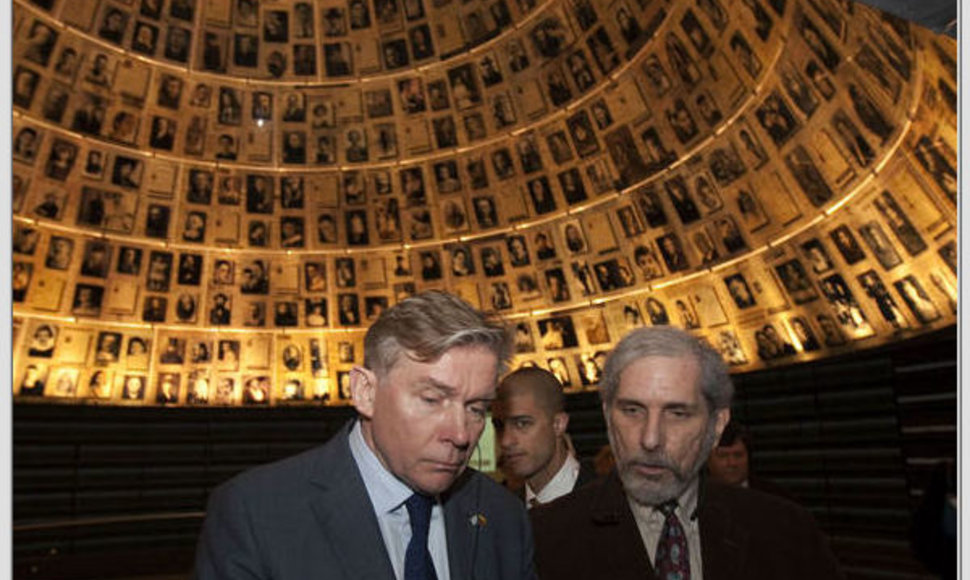On 20 April, the Minister greeted participants of the March of the Living, came to the opening of a photography exhibition ‘Synagogues in Belarus - Jewish Heritage Reflections in the Grand Duchy of Lithuania’ and attended a discussion on Lithuania’s Jewish history at the Ministry of Foreign Affairs.
“There are more and more people in Lithuania who are determined to seek the truth relating to the horrible history of the Holocaust and nourish the cultural heritage of Lithuanian Jews. Thanks to the effort and diligence of scholars, historians, artists, museum staff, pedagogues, painters, musicians, theater performers and other professionals, the missing parts of history are being filled in our society,” the Minister said.
According to him, excellent international cooperation with different partners, first of all, Israel and the US, the active participation of Lithuania in the Task Force for International Cooperation on Holocaust Education, Remembrance and Research that brings together different professionals, diplomats and politicians from 28 countries across the globe as well as in the work of the International Commission for the Evaluation of the Crimes of the Nazi and Soviet Occupation Regimes in Lithuania, is already bearing fruit.
“I do hope that our mutual experience, our respect for victims of the Holocaust, the historical memory and raising the awareness of the general public and, especially, that of the young generation shall help us fulfill the sacred oath ‘Never again,’” Ažubalis said.
Educational efforts showing results
The Minister believes that a comprehensive program of commemorative events dedicated to the remembrance of the victims of the Holocaust in Lithuania, which was implemented by the Seimas (Parliament) and the government of Lithuania in 2011, has contributed considerably to the maturity of the society. “Therefore, in a free Lithuanian democracy, the Holocaust, that was kept in silence in the Soviet years, is no longer an ‘alien pain,’” he stressed.
The photography exhibition was designed based on data from the research of synagogues that were built from the 17th century through the 19th century in the territory of the Grand Duchy of Lithuania. The research was carried out by Lithuanian and Belorussian students from Vilnius Academy of Arts and the Belorussian State University. The photography reflects the complex history of the Lithuanian Jewish cultural heritage that had flourished there since the 17th century and the tragic losses suffered in the 20th century.
The exhibition is part of a long-term project, which is financed under the Development Cooperation Program of the Foreign Ministry and implemented by the Centre for Jewish Culture and Information.
“Tolerance, culture, trade, and knowledge exchange and especially respect for the ethnic and religious diversity, constitute the most precious heritage of the Grand Duchy of Lithuania that we cherish and want to pass on to the younger generations,” Ažubalis noted.
The Foreign Ministry also presented several new books: a collection of articles entitled “The Holocaust in Lithuania in 1941-1944,” compiled by historian Dr. Arūnas Bubnys, and a new edition in English of the book “Jews, Lithuanians and the Holocaust,” by Professor Alfonsas Eidintas, an Ambassador-at-Large.
For the fourth time in a row, Holocaust survivors from Israel who are taking part in the March of the Living, along with the Lithuanian Jewish Community and leadership of Israel and Lithuania, are paying tribute to the victims of the Holocaust in Paneriai, visiting other sites important to the perpetuation of memory of the victims of the Holocaust and Jewish historical sites, taking part in the ceremony honoring Righteous Among the Nations for rescuing Jews and meeting with Lithuanian politicians at the Seimas and the government.
Latvian efforts praised
On Friday, the United States State Department’s Special Envoy to Monitor and Combat Anti-Semitism Hannah Rosenthal met with Latvian Foreign Ministry State Secretary Andris Teikmanis, during which she praised Latvia for gathering information on those people who helped save Jewish lives in Latvia during World War II.
Rosenthal praised the fact that Latvia has collected information on approximately 400 people who helped save Jewish people during Worl War II, which is a substantial number compared to countries with larger populations.
During the meeting, Rosenthal said that after her visit to the Occupation Museum, she now has a better understanding about Latvia’s complicated history, and highly praised the museum’s exhibits. Speaking about Holocaust research and education, the two sides were in agreement that Latvian students should be taught more about those who helped save Jewish lives in Latvia.
During her current visit to Latvia, Rosenthal was to meet with the leaders of the Council of Jewish Communities in Latvia, government officials and non-governmental organizations.
Rosenthal also visited Riga’s Jugla High School to meet with students and gave the lecture: Multi-ethnic and Multi-cultural Heritage as Strength: The American Experience.
Rosenthal was also to visit historic Jewish sites throughout Latvia, including the Zanis Lipke Memorial in Kipsala, and tour the Riga Ghetto, Latvian Holocaust Museum and the Occupation Museum.
2012 04 26
Audronius Ažubalis: Holocaust awareness on the rise
Due to the efforts of scholars, people in culture, artists and educators who are telling the truth about the painful history of the Holocaust, which was hushed up in Soviet times, Holocaust awareness is rising in Lithuania, Lithuanian Minister of Foreign Affairs Audronius Ažubalis says, reports ELTA.
Report mistake
Successfully sent
Thank you












